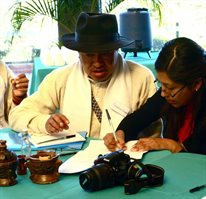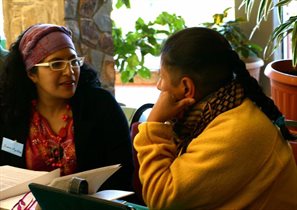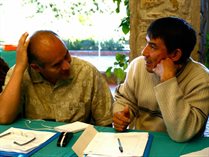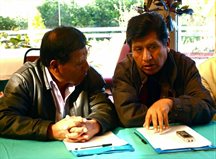1 Creativity and Motivation
To
delve into the topic of creativity and its motivations, the workshop opened by
asking the following questions, which were discussed first in pairs and then in
four groups:
Activity 1 - Motivations for creativity
Question 1: What has been the motivation or inspiration, which led you to develop a creative work? Can you provide an example?
Summary
of discussion
It is notable that during these initial discussions nobody mentioned
economic compensation as a motivation for their creative activities.
 The participants highlighted many social motivations; they said they create in order to share, meet, and communicate with other people. They also mentioned how creative work often
serves a group’s need to identify itself and similarly to be recognized by
others. It was pointed out that
creativity is always founded on the social: no one comes alone into the world; everyone
comes from a mother. Environment, nature,
beauty, cosmovision, and communication with superior beings were also
emphasized as important stimuli. Moreover, some participants said they were
motivated by their need to express themselves (their feelings, dreams, and
memories), to change the world, to conduct research, and to solve concrete
problem.
The participants highlighted many social motivations; they said they create in order to share, meet, and communicate with other people. They also mentioned how creative work often
serves a group’s need to identify itself and similarly to be recognized by
others. It was pointed out that
creativity is always founded on the social: no one comes alone into the world; everyone
comes from a mother. Environment, nature,
beauty, cosmovision, and communication with superior beings were also
emphasized as important stimuli. Moreover, some participants said they were
motivated by their need to express themselves (their feelings, dreams, and
memories), to change the world, to conduct research, and to solve concrete
problem.
Celestino Campos and Janela Vargas - Photo credit: Phoebe Smolin
Participants
discussed different attitudes about cultural change. Some participants defended
the idea that when elders transmit culture to children and to the youth of
indigenous peoples, at least among the Guaraní, they do not expect children to
repeat exactly what they have learned. On the contrary, they teach with the
expectation that what has been learned will be transformed continuously. In children and youth, they are implanting a “seed”
of cultural change that is built into these societies. It was mentioned that a
culture must adapt to the times. During the workshop, these alternative
perspectives stood in contrast with others that reflected anxieties about cultural change.
 These discussions provoked another question: "Does adaptation necessarily involve distortion?" Some participants questioned the concept of "distortion," arguing that the difference between a "distortion" and an "adaptation" appeared subjective. Others wondered, "When one takes a product resulting from someone else's creativity and modifies it, adding one's own creativity, which of these creativities is better or more valid?"
These discussions provoked another question: "Does adaptation necessarily involve distortion?" Some participants questioned the concept of "distortion," arguing that the difference between a "distortion" and an "adaptation" appeared subjective. Others wondered, "When one takes a product resulting from someone else's creativity and modifies it, adding one's own creativity, which of these creativities is better or more valid?"
Even if creativity is always based upon past experience, knowledge, and models, participants nonetheless believed that every creative expression is "made anew." Considering the idea that culture cannot exist without referring to the past, an important question emerged: How can a balance between the past and present be achieved in relation to respect, recognition and creativity?
Ximena Martínez and Julieta Paredes - Photo credit: Henry Stobart
Some
participants distinguished between, on the one hand, the creativity of the ancestors
who drew inspirations from their environments, and on the other hand, today’s
creativity that seems to make more use of technology. Others insisted that
although some things appear unchanged, so-called “technology” is always changing;
for example, changes in musical instruments are also part of technology shifts.
Participants underscored the need to analyse creativity in relation to
patriarchy and colonialism. Rather than only speaking in masculine terms, it is
critical to recognize many different creativities that reflect sexed and
gendered bodies as marked by the colonial legacy, a legacy that frequently
places women as second tier subjects.
Activity 2 - Creativity and remuneration
Question 2: What creative work would you produce without any expectation of remuneration? What creative work do you consider should be remunerated? Can you provide examples? What do you believe is the difference between these cases?
Summary
of discussion
This set of questions
provoked less discussion than the first, in part because less time was
dedicated to it.
 Some groups recognized that in many cases, people engage in creative work without expecting any payment, seeking instead social recognition, which in practice can be quite limited. Some participants noted that payment is not usually involved for creative work when one does it for oneself or as a daily life task, or when it is done as a gesture of affection or as a means of sharing with friends, family, or community. Nonetheless, for those who make a living from their creative work, some participants felt strongly that compensation was indispensable. Other participants disagreed and argued, “art is made from the heart…and not to receive money.” Some suggested that perhaps the difference between remunerated and unremunerated creative work is determined by the kind of interpersonal relationships present in each case. For example, some participants considered that when the creative work is internal to the community, it should not be remunerated, but that when this work moves beyond the community sphere, it should be. They stated that creative work is a fundamental part of what it means to be human, but that one must also recognize how the meaning of this work changes with the market. People mentioned how money changes the meaning of creativity and of the social relations surrounding such work.
Some groups recognized that in many cases, people engage in creative work without expecting any payment, seeking instead social recognition, which in practice can be quite limited. Some participants noted that payment is not usually involved for creative work when one does it for oneself or as a daily life task, or when it is done as a gesture of affection or as a means of sharing with friends, family, or community. Nonetheless, for those who make a living from their creative work, some participants felt strongly that compensation was indispensable. Other participants disagreed and argued, “art is made from the heart…and not to receive money.” Some suggested that perhaps the difference between remunerated and unremunerated creative work is determined by the kind of interpersonal relationships present in each case. For example, some participants considered that when the creative work is internal to the community, it should not be remunerated, but that when this work moves beyond the community sphere, it should be. They stated that creative work is a fundamental part of what it means to be human, but that one must also recognize how the meaning of this work changes with the market. People mentioned how money changes the meaning of creativity and of the social relations surrounding such work.
Iván Nogales and Juan Baptista Parapaino - Photo credit: Phoebe Smolin
In spite of differing visions of culture and its dynamics, a consensus formed around the idea that creativity operates within a field of power relations that are often overlooked or marginalized during discussions about these topics. The juxtaposition of the terms “art” or “artist” on the one hand, with “culture” on the other, masks these power relations that deserve more critical attention.
 During the course of the conversations, the workshop organizers intervened with mini-presentations on dynamic and holistic approaches to thinking about culture, and on the history of copyright. For example, royalty collection societies often argue that remuneration is a key stimulus for creativity, and that without it and the protections provided by intellectual property rights, this motivation could disappear. However, in some historical laws, the author or licensed press could monopolize copyrights only for a very limited period of time. For example, the 1710 Statute of Anne of England prescribed a copyright term of 14 years with a provision of renewal for 14 additional years, before the work moved to the public domain with the goal of stimulating competition; the work would then become the basis for others’ creativity. The organizers discussed today’s extensive lengthening of copyright terms, mentioning the current state of copyright in Bolivia and the justifications given by defenders of the World Intellectual Property Organization (WIPO) and the Berne Convention. They mentioned how these copyright structures have posed challenges for North American hip-hop musicians who have worked with an aesthetic of remix (see attached case studies and glossary).
During the course of the conversations, the workshop organizers intervened with mini-presentations on dynamic and holistic approaches to thinking about culture, and on the history of copyright. For example, royalty collection societies often argue that remuneration is a key stimulus for creativity, and that without it and the protections provided by intellectual property rights, this motivation could disappear. However, in some historical laws, the author or licensed press could monopolize copyrights only for a very limited period of time. For example, the 1710 Statute of Anne of England prescribed a copyright term of 14 years with a provision of renewal for 14 additional years, before the work moved to the public domain with the goal of stimulating competition; the work would then become the basis for others’ creativity. The organizers discussed today’s extensive lengthening of copyright terms, mentioning the current state of copyright in Bolivia and the justifications given by defenders of the World Intellectual Property Organization (WIPO) and the Berne Convention. They mentioned how these copyright structures have posed challenges for North American hip-hop musicians who have worked with an aesthetic of remix (see attached case studies and glossary).
Mario Peñaranda and Ramón Caizari Coca - Photo credit: Phoebe Smolin

Rethinking Creativity, Recognition and Indigenous Heritage by https://www.royalholloway.ac.uk/boliviamusicip/home.aspx is licensed under a Creative Commons Attribution-NonCommercial 4.0 International License.
Based on a work at https://www.royalholloway.ac.uk/boliviamusicip/home.aspx